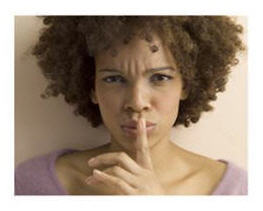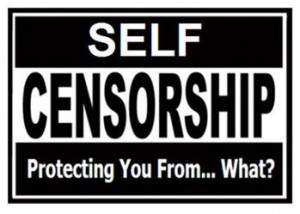“God, she’s trashy.”
 Stop. That’s a terrible thing to say.
Stop. That’s a terrible thing to say.
Shaking the head. Clucking the tongue. Pursing the lips. It’s all unconscious – this physical manifestation of disapproval. And something deeper. Anger.
No, more than anger. Outrage.
“Well it’s true. She bad mouths everyone. You’d think she’d realize how classless it is. And people pay her to show up and trash talk?”
Stop it. This is pointless. Put it away.
“This country has lost its mind. What we value. What we don’t.”
Enough. You know what you’re angry about. Put it away. Or put the energy into constructive action.
And so I do. I put it away. I turn off the television. I tuck the voice and the anger into a corner – the voice that is judging someone else, commenting on the small slice of misbehavior that’s playing out as it illustrates issues of values, of good people dismissed, of falling through the cracks.
And I admit to my anger in seeing so many compensated for silliness – in front of cameras. I know it may not be real, though it purports to be “reality.” Still, in my gut, I find it distasteful. And equally, my visceral response to it.
Judge the behavior, not the person
I’ve tried to learn to judge behavior, to contextualize it by imagining motivation, to recognize that I can’t possibly know the “reality” someone else is living or feeling. This is a painful lesson, a difficult lesson, one I’ve spent a lifetime trying to master – do not judge another person.
Yet it’s rare that I don’t judge myself – and more harshly than I would someone else.
This morning, the Self Censor stepped in again – as I stepped on the scale – something I don’t do daily. I’m eating well, but mindfully; I’m pressing forward to fit my skinny jeans, something trivial in the grand scheme, yet I feel better at a certain size and know that reality.
But I ate more than usual through the weekend. I could feel the difference, which the scale confirmed.
“Asshole. Look what you did.”
Stop it. That doesn’t help.
“Was it worth it?”
Stop. And step off.
Self Censorship, Self Flagellation, Self Awareness
Am I the only one with these conversations circling in my head? Admonishing, reassuring, and scolding again?
 Oh, it’s not all day, and it’s not all the time, but these go-rounds have been part of my internal dialog for as long as I can remember. They take on the character of my mother’s critical voice – quick to undermine, slow to forgive, and woefully contradictory in its power for change.
Oh, it’s not all day, and it’s not all the time, but these go-rounds have been part of my internal dialog for as long as I can remember. They take on the character of my mother’s critical voice – quick to undermine, slow to forgive, and woefully contradictory in its power for change.
They take on my own adult voice, at times useful and others, more aggravating noise.
I remind myself that there is a considerable difference between filtering what we say aloud and allowing ourselves to feel what is expressed in internal dialog. And even – to persist in the conversations that encourage us to stand up for our child selves with the support of our adult selves.
Irritation at bad behavior viewed on the tube? Anger at the way we knock each other down, look the other way, and hold no one accountable?
Maybe that’s a good sign, that I bristle at these moments. Maybe I shouldn’t censor the censor, except to find kinder words for myself. Those that do not self-flagellate. Those that nonetheless retain their clarity.
If you feel it, is it real?
I may try to practice “if you don’t have something nice to say, say nothing at all,” but does that mean I must censor my inner voice that reflects my values – and equally – that is expressing dismay or disapproval?
Aren’t we told to practice positive thinking?
Aren’t we also told that keeping negative emotions bottled up inside leads to deleterious health consequences? If we feel it, isn’t it real? Doesn’t the “it” – the emotion – deserve its space in our heads, even if not a more public airing?
Must we censor our inner dialog? Is it unhealthy to do so? Aren’t we entitled to the awareness of all our feelings – which is different from expressing them inappropriately around others?
The Healthy Voice
I’m reflecting on the adult voice that tries to squelch the criticism of what I deem to be cultural encouragement of bad behavior. It’s my opinion, it’s my judgment, and yet I judge myself for expressing that opinion to myself.
 Silly, isn’t it? Why shouldn’t we allow ourselves to think poorly of ugly behaviors, and even more so, of a society that rewards them?
Silly, isn’t it? Why shouldn’t we allow ourselves to think poorly of ugly behaviors, and even more so, of a society that rewards them?
Shouldn’t we be able to speak our minds – in our own minds?
And I’m grateful for the adult voice which guides me to put a weekend of enjoyable eating into the context of enjoyment, to channel my anger into something constructive when it comes to my own demons and my own behaviors. To speak up where it counts. And I ask myself if we can pick and choose the voices in our heads, give them their due, including the helpfulness of a vigorous argument. I ask myself if we can learn to fight fair – with ourselves.
Breathe, Edit, Filter
As a single parent, there were days – even years – when the stresses were so onerous that reactionary anger – disproportionate anger – was the result. Naturally, apologies followed.
With time, and lecturing myself, I got better at taking a breath, editing in my head, and filtering what came out of my mouth and the way it came out of my mouth.
Anger bubbles up from places we may not realize as the words tumble out. And as parents, the ability to hurt our children through words is much greater than we sometimes admit.
In this situation, I’m grateful for the Self Censor who plays more the role of Editor. I’m grateful to have learned to take that breath, to consider the way I phrase and deliver, and not to damage my children in the process.
Relationship Rigor
There’s much to be learned by our inner censors, and much to be developed by our inner editors. In relationships, misplaced anger may be the stuff of old wounds, of former lovers, of mournful marriages in which we said too much – or possibly too little.
 We talk about happiness; about making ourselves happy, our partners happy, our children happy. Happiness isn’t a destination – it’s a catch-all term for an emotional state, potentially fleeting, clearly desirable, but not the be-all-and-end-all we make it out to be.
We talk about happiness; about making ourselves happy, our partners happy, our children happy. Happiness isn’t a destination – it’s a catch-all term for an emotional state, potentially fleeting, clearly desirable, but not the be-all-and-end-all we make it out to be.
Sometimes it’s little more than an excuse for bad behavior.
As for taking a breath, considering our words, and communicating clearly but kindly? It’s not so easy, but it is a vital skill if we’re to speak well to those we love, encourage them to use their censors and filters wisely, and value our joyful moments as well as those that are more painful to process. Isn’t it all part of relationship rigor – articulating what we value, what we want, what we need, and how we feel about it? Shouldn’t relationship rigor be applicable to the relationship with ourselves – as well as others we deal with personally or professionally?
I remind myself that censoring my own thoughts protects me from nothing; honesty in expressing my feelings freely – with myself – is not only my right, but my responsibility.
- Do you know the difference between censoring and editing?
- Do you pay attention to your inner dialog?
- Can value systems be challenged and changed when we open ourselves up to more voices?
- Can body image issues be addressed more directly, when we recognize our self-destructive thoughts?
I want to be a better person – I am so critical. I don’t know that I can change my thinking but I do try to change my speaking – and much more so lately. I don’t want to be that mother with the sharp tongue – I grew up with that and that’s why I have it. Modeling good behavior can be very challenging when it goes against your nature but as a parent, I do have that responsibility and I try to uphold it.
When we grow up with that “mother with a sharp tongue,” I think we hear her voice (in our own?) at times. It’s good motivation to speak differently to our own chidlren. Thanks for stopping by and commenting, Cathy.
Am I the only one with these conversations circling in my head?
er, no.
we’re with you on that particular issue 😉
thanks so much for visiting us. *smiling bravely through bloody synthroid*
Sending cups of virtual tea your way, _tg (and thank you for making me feel less um… eccentric?) – perhaps I should send along some Fireside Love Potage as well? (I’m sipping a cup now that I made late last night. All organic, easy to make, and oh-so-good!)
When I used to lead Weight Watcher’s, I asked everyone in the room how many trash talked to themselves. How many said things like, “You suck.” “You’ll never lose the weight.” “You have no control.” Everyone nodded their heads. Then I say, “How many would talk this way to your best friend?” No one raised their hands. “Then why do you think it’s okay to talk this way to yourself?” Be gentle with yourself and you’ll be gentle to others.
Good words for us to remember, Michelle. Thank you. And loved your post on emotional eating. Such an important issue.
I once heard “Don’t say it if it’s not true, it’s not kind and it’s not necessary.” If I apply that fully it is remarkable how little I have to say! It seems to me that the quality of my conversations rises immensely as well. I’m not in the habit of being hateful and I try not to hang out with people who create ugly thoughts in my head. I appreciate we don’t have full control over our work colleagues, or family members, but I can chose friends who give me positive thoughts.
Like everyone, I have lots of monkeys in my head. For what it’s worth, the one I’ve learned to be wary of is the one who says, in so many words, The experience you’re having is wrong, and you’re wrong for having it.